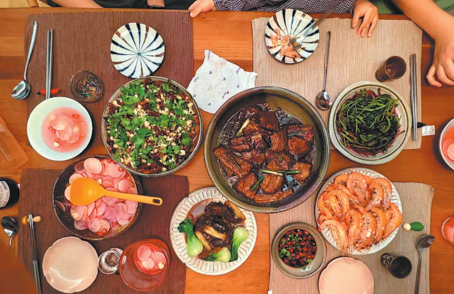Kitchen wizards establish on-demand careers

A wok sizzles as garlic cloves and Chinese kale hit the hot oil while pork rib and lotus root soup bubbles on a stove. A whole fish, steamed and doused in soy sauce, sits on the kitchen counter next to a pile of spicy crawfish coated in chili oil.
Ding Yuqing, 23, juggles these dishes while navigating an unfamiliar kitchen. A college student in Wuhan, Hubei province, she is busy making a feast for a family who hired her to cook in their home.
Ding is part of a rising wave of Chinese youth embracing a new gig — "on-demand chef". Students, office workers and freelancers offer homemade meals to time-starved urbanites seeking healthier meals, comfort, and a taste of home.
The trend continues to rise on social media. Hashtags related to on-demand chefs have amassed over 1.45 billion views on Douyin and over 35 million on Xiaohongshu, or Red-Note. Notably, a viral story about a woman earning nearly 20,000 yuan ($2,784) a month cooking six meals a day rocketed to the top of Sina Weibo's trending list last month.
For Ding, it all began with a few food photos. Over winter break last year, she posted snapshots of her home-cooked dishes. To her surprise, requests started rolling in, asking: "Can you come cook for me?"
"At first, I was nervous cooking in someone else's kitchen," she says. "Now it's second nature."
She now offers services within a 10-kilometer radius on weekends and during school breaks. Before each visit, she discusses food preferences with her clients and asks them to supply ingredients and seasonings. After preparing the meals, she tidies up, washes the dishes, and even takes out the trash for her clients.
Ding receives 80-100 yuan for a typical order of three dishes and a soup. Most of her clients, she notes, are young people juggling hectic schedules. One repeat customer, a 30-year-old office worker, has hired her more than 30 times. "The customer and her husband are too busy to cook," Ding explains.
Statistics show that China's busy urban workers have long relied on the country's sprawling food delivery sector, which employs over 10 million couriers, but Ding's case reflects a consumption upgrade, with a sizable number of urbanites willing to dig deeper into their pockets for healthier and bespoke alternatives.
Li Xiaoyang, a 30-year-old from Wuhan, says this novel service has become essential for him.
"Having someone cook for you means personalized dishes, better hygiene and a more relaxed atmosphere, whether it's a family dinner or a classmate reunion," Li says.
Hu Quanyu, founder of Chef51, an on-demand platform that connects professional chefs with customers, says the service now operates in over 50 cities nationwide and partners with more than 1,500 chefs.
Hu plans to launch a new platform aimed at part-time cooking enthusiasts, allowing them to pick up orders posted by users. The system will provide basic checks like ID and health certificates.
"On-demand home cooking is more affordable and flexible for budget-conscious consumers," he says, adding that the trend reflects changing consumption habits among younger generations who, fueled by rising incomes, are increasingly investing in health, convenience, and quality of life.
China's "on-demand economy "has diversified rapidly in recent years, with services ranging from in-home elderly care to organizing home spaces. These offerings are hailed for meeting personalized demands, which promote consumption and create much-needed new job opportunities.
The number of flexible workers in China exceeded 265 million in 2024, including 175 million engaged in platform-based gig work, according to an industry report by Hangzhou-based Gongmall. By 2050, the sector's total revenue is expected to exceed 50 trillion yuan.
Still, the fast-growing on-demand chef industry is not without risks and shortcomings. While recognizing its contribution to flexible employment and urban lifestyles, Hu Junjie, a lawyer based in Hubei, says safety and liability concerns remain due to a lack of regulations. The lawyer thus calls for a clearer legal framework, better worker protections, and more oversight from relevant platforms and authorities.
For some, like Xia Lu (not her real name), the on-demand chef role has evolved from a side hustle to a full-time profession. Burned out from long working hours, the 27-year-old Sichuan native, known by social media followers for her fiery, flavor-packed dishes, quit her job at a foreign-owned company in Beijing in late 2023.
She now charges a minimum of 128 yuan per trip and handles up to three clients per day. While her current monthly income of about 7,000 yuan is lower than her previous job, Xia relishes the spare time it offers her.
"When the weather is good, I go hiking. When it rains, I rest," she says.
For Ding from Wuhan, the momentum is just beginning: "The business not only meets the evolving needs of health-conscious consumers, but also gives passionate cooks like me a meaningful and flexible career path."
Xinhua

Today's Top News
- The farmer, the snake and Japan's memory hole
- Crossing a milestone in the journey called Sinology
- China-Russia media forum held in Beijing
- Where mobility will drive China and the West
- HK community strongly supports Lai's conviction
- Japan paying high price for PM's rhetoric






























